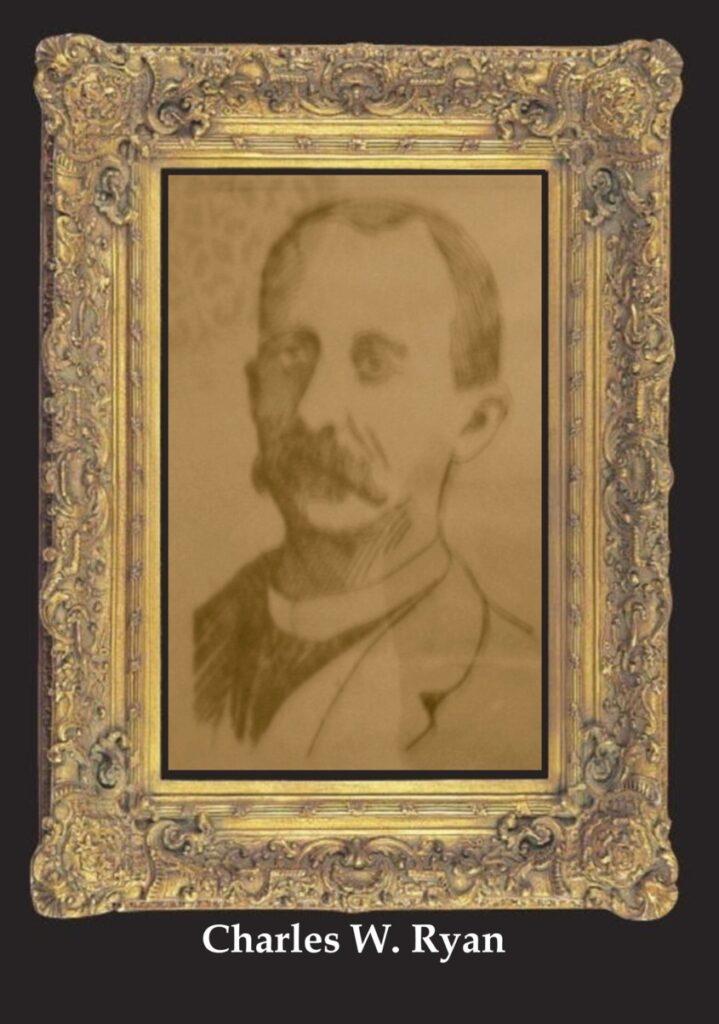On 14 March 1901, a Civil War veteran, Charles W. Ryan was shot and killed during a robbery at the Halifax National Bank in Halifax, Dauphin County, Pennsylvania, by one of the two men committing that robbery. Ryan, who was serving as cashier at the bank, was also one of the bank’s founding shareholder members. The president of the bank, Abraham Fortenbaugh, who was also present during the robbery, was slightly injured in a scuffle that took place in capturing and restraining the robbers, but he witnessed the death of his friend Charles W. Ryan and later lamented that he wished that Ryan had not attempted to break up the robbery by seizing one of the robber’s guns. Both robbers were subdued and captured and quickly tried for Ryan’s murder and in January 1902 were hanged in Harrisburg. The story of the bank robbery and the eventual trial and execution of the perpetrators, as well as the Civil War connections of those involved, was told in a series of previous posts, which can be found on the Civil War Blog under the keywords “Halifax Bank Robbery.”
Abraham Fortenbaugh‘s reflections on the incident at the Halifax National Bank were told in a story that appeared in the Harrisburg Daily Independent, March 16, 1901:
MR. FORTENBAUGH’S EXPERIENCE
The President of the Halifax Bank Tells the Story of the Affair
The Hon. A. Fortenbaugh, President of the Halifax National Bank, is one of the most amiable men in this section of the state. He has served the people as a school director, member of council, burgess and representative in the legislature. As a member of the General Assembly he was known as among the most thoughtful and conscientious men on the floor. His counsel was sought by his party associates in important emergencies and by men of all parties when questions of moment were under consideration. He served in the first legislature under the new constitution, and participated in the legislation to adapt the affairs of the state to conform to the new organic law.
Mr. Fortenbaugh was a trifle the worse for wear yesterday. He was in the bank on Thursday when the raid was made and was covered by revolvers in the hands of Keiper, just as the other burglar leveled guns on Cashier Ryan. Mr. Fortenbaugh threw up his hands, according to order and obeyed the directions of the robbers generally, for a time. “Did you ever hold up your arms in that fashion for a considerable time,” Mr. Fortenbaugh asked an old friend, yesterday, and on receiving a negative answer continued, “Well, it’s very tiresome. Every now and then my arms would come down part way and the robber would put the pistol closer to my head and profanely demanded that the hands be put up higher. Of course, I promptly obeyed.”
“I have always felt afraid of firearms,” continued Mr. Fortenbaugh, talking among friends last evening, “and in this crisis realized the full measure of the danger. But when I saw Ryan make the dash for Rowe’s pistol I knew that there would be trouble and got into the scrimmage. I seized the robber around the body, pinioned his arms. But my strength was unequal to the task. After a few struggles he threw me off and I landed between the vault and the washstand, some eight or ten feet away from the encounter. The singular thing, however, was that when Ryan was in imminent danger I forgo all about all my own fears, and got into the fight head over heels.
“It would have been better if Mr. Ryan had not seized the pistol,” continued Mr. Fortenbaugh, with a sob in his voice. “I would much rather the bank had lost the money than he should lose his life. He was a splendid man and no doubt was influenced by his keen sense of duty to the bank. I shall never forget his fidelity and courage. If he had less of either the bank might have been out the money in the satchel, but it would have been the gainer by the preservation of his life and the continuation of his services.”
Mr. Fortenbaugh was a trifle lame yesterday and somewhat stiff from the rough usage he received in the encounter, but his nerves were all right and all things considered, he was in good spirits. But he made a narrow escape and appreciated the fact. The death of his friend and associate in business was his principal source of regret, and whenever that feature of the affair was referred to he was overcome with emotion.
_________________________________________________
First published on the Civil War Blog, July 8, 2016.
Corrections and additional information should be added as comments to this post.
